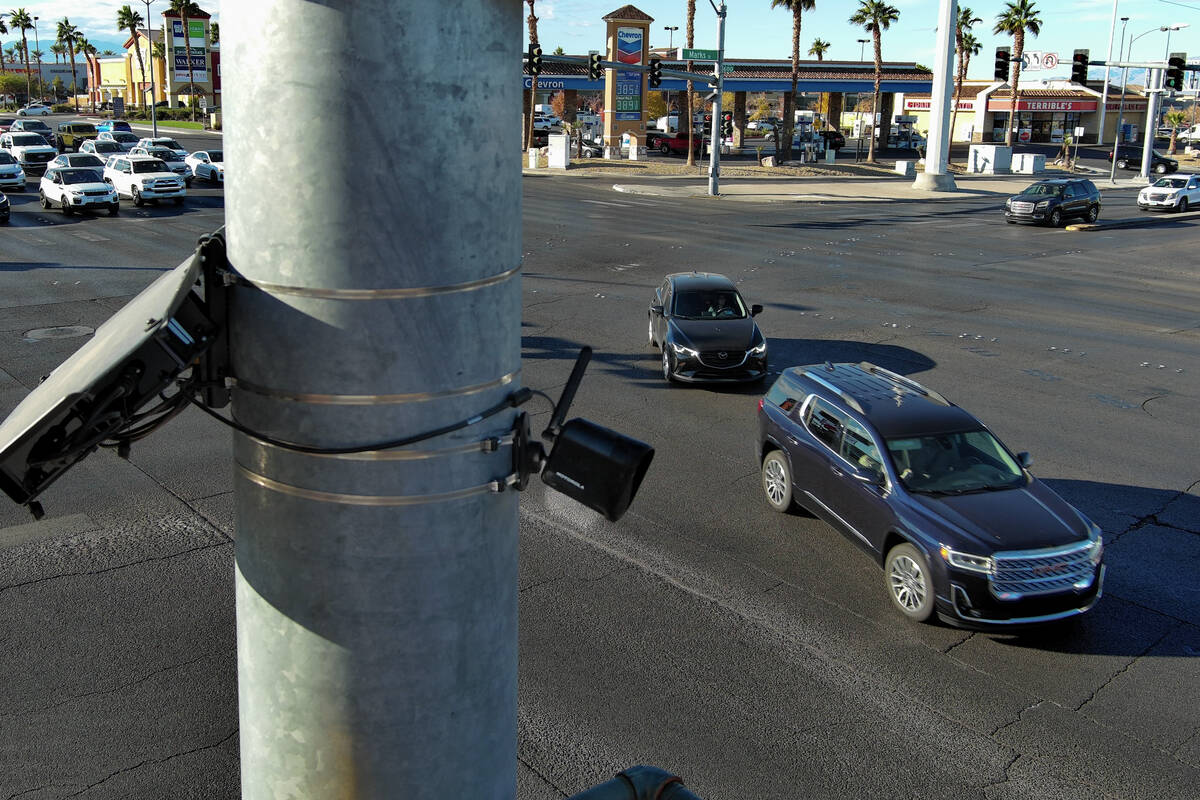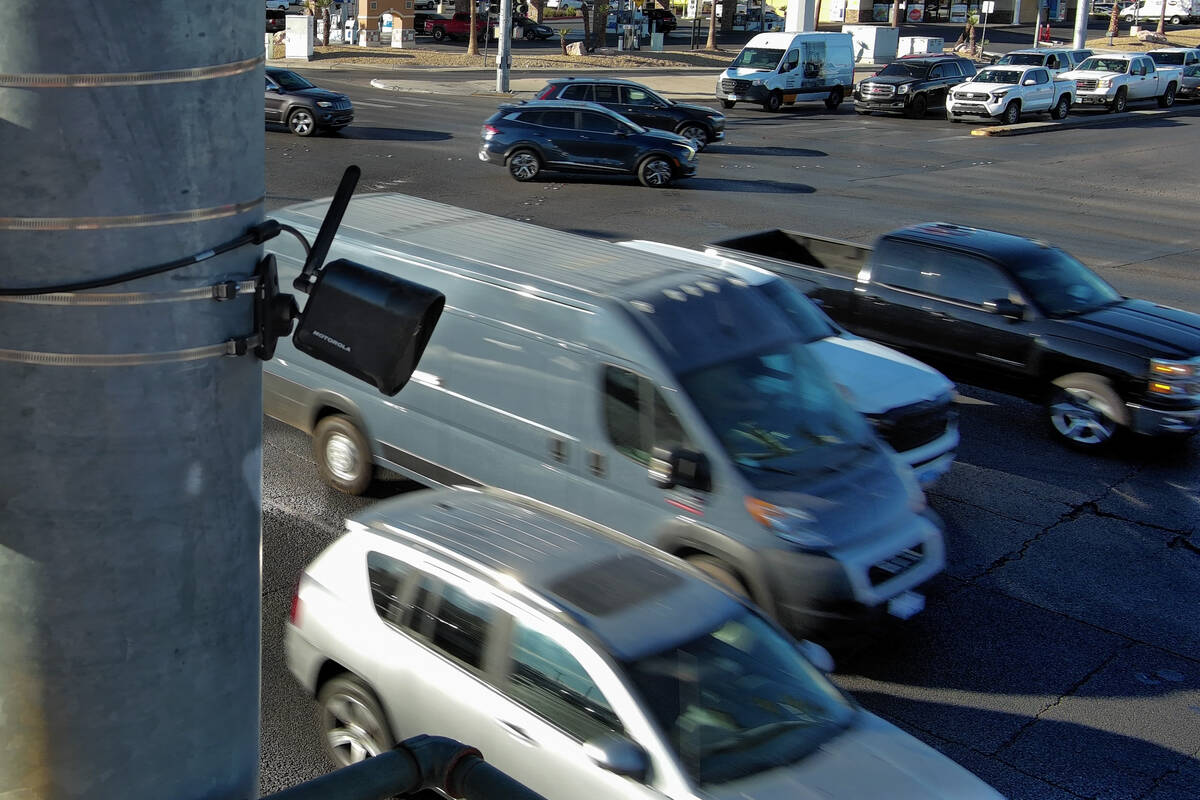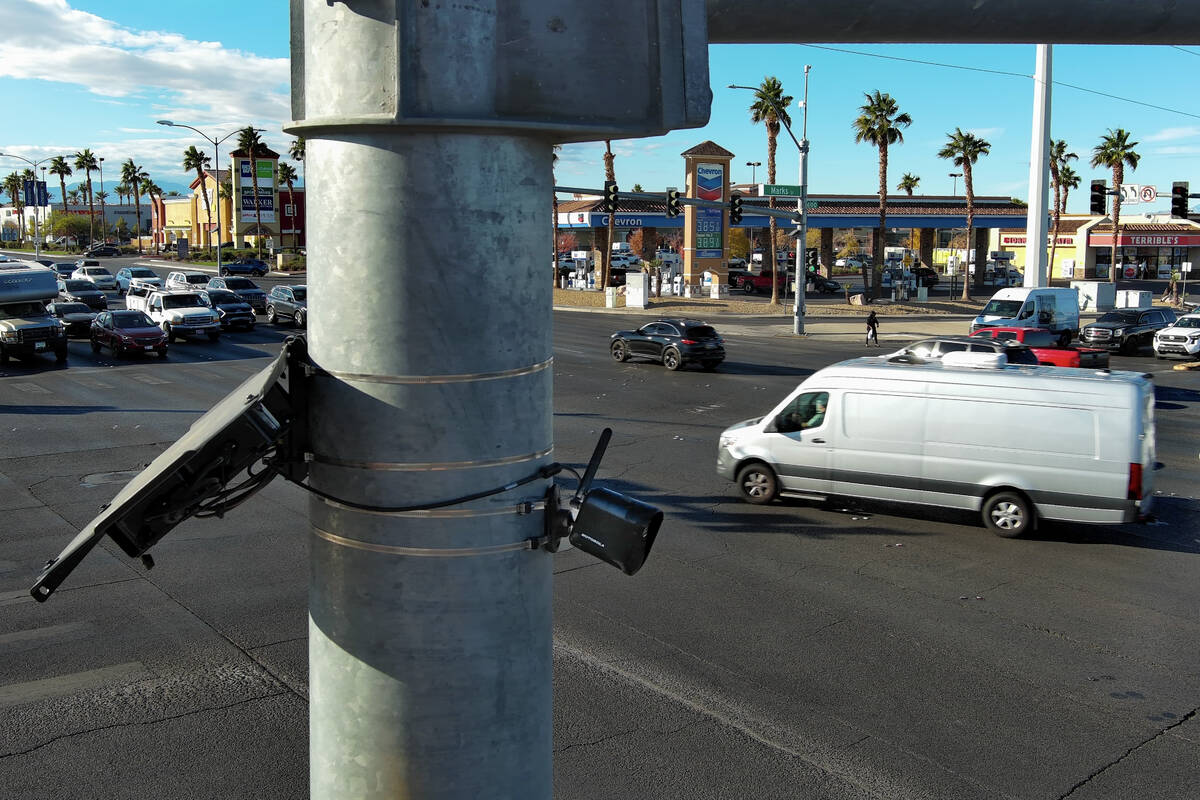Privacy advocates raise alarms over more license plate readers in Henderson
Privacy advocates are raising concerns after the Henderson Police Department announced it will be adding another 54 license plate reading cameras around the city and on police vehicles.
These cameras help police locate missing or endangered persons and stolen vehicles, according to a Henderson Police Department press release.
“One of the statistics that we note is that approximately 70 percent of all crimes involve a vehicle. Therefore, it’s a useful tool to help us in solving these crimes,” Henderson police Lt. Tony Niswonger said.
But privacy experts questioned how data collected from those cameras will be used and they criticized the overall use of surveillance technology by law enforcement.
“For millions of people, their activities in their vehicles are being surveilled,” said Beryl Lipton, a senior investigative reporter at the Electronic Frontier Foundation, a San Francisco-based nonprofit whose website says its mission includes defending civil liberties in the digital realm.
“The general consequences of (automatic license plate readers) are the undermining of our freedoms when we live in a society that is under ubiquitous surveillance,” said Jeramie Scott, the director of the Project on Surveillance Oversight at Electronic Privacy Information Center, a Washington, D.C.-based nonprofit that advocates for privacy rights in the digital age, according to its website.
Jacob Smith, staff attorney at the American Civil Liberties Union of Nevada, said there can be no balance struck between using license plate readers to effectively fight crime and respecting residents’ privacy.
“When it comes to invading peoples’ personal privacy, I don’t think a balance should be struck at all,” Smith said. “The police should not be engaging in a surveillance state.”
What they do
Niswonger explained what the license plate readers do.
Henderson police’s new cameras, he said, will take images of a vehicle’s license plates and cross-check plates against a list of vehicles that have been flagged as linked to criminal activity or involved in missing or endangered persons.
The new cameras will bring Henderson police’s total amount of cameras to 72. Fifty-four will be mounted on stationary poles and 18 will be mounted on police vehicles, Niswonger said.
The new cameras will be placed in strategic areas of Henderson, police have said. Niswonger declined to say where specifically the cameras would be placed.
“It could be high-crime areas, but it also could be major intersections where we can get more efficiency out of the placement of the cameras,” Niswonger said.
Lipton and Scott said that, in general, the technology opens up the possibility of disproportionate policing.
“Often what we see with surveillance systems, and this is true of automated license plate readers, is that they’re disproportionately placed in low income areas, in more black and brown neighborhoods,” Scott said. “So they end up having a disproportionate impact on those communities.”
When asked whether cameras would be fixed in lower-income and minority communities, Niswonger said that camera locations would be moved based on the most recent data.
“These are not fixed locations. We can reanalyze statistics and or look at certain crime trends, and reallocate those resources in different locations,” Niswonger said.
What happens to the data?
Police will delete images of license plates if they are not of interest, Niswonger said.
“If we determine that the information is not going to be utilized or is not useful in a criminal or a civil case, then the information will be purged after a certain time period,” said Niswonger.
Lipton was concerned that deleted information might not actually be purged. Although data on the police side is deleted, the same data might exist on a third party server, Lipton said.
“It’s a growing privacy concern that even if they have, on the initial intake, deleted something, it still exists somewhere else,” said Lipton.
‘It doesn’t tell us who’s in the car’
There is also the potential for police officers to abuse automatic license plate reading systems, Lipton said.
“They might use it because they have an interest in a particular a potential romantic partner. We’ve seen them abuse it because they have had ex romantic partners, and some new romantic partners,” said Lipton.
Niswonger noted that license plate readers don’t provide any information about who is in the vehicle.
“It only provides us information about a license plate and whether it’s on a hot list or not,” Niswonger said, “So, even though it may capture a license plate and a vehicle description, it doesn’t tell us who’s in the car. It doesn’t tell us who they’re with, or what their names are or anything.”
Another point raised by critics is that the cameras could also be used to track movements from sensitive areas like religious places of worship, protests, immigration clinics and health centers, Lipton said.
“I think these cameras, and especially implementing so many of them, constitutes a significant invasion of privacy,” Smith said.
Review-Journal Assistant City Editor Brett Clarkson contributed to this report.
Contact Annie Vong at avong@reviewjournal.com. Follow @annievwrites on X or @annievong.bsky.social.




















